
Ecommerce Expansion and International Partnerships Thrive
Share
Ecommerce expansion and international partnerships are propelling businesses towards unprecedented growth, with cross-border commerce expected to account for 20% of global ecommerce sales by 2023. As the global ecommerce landscape evolves, Russia's ecommerce sales are projected to reach EUR 30 billion, driven by shifting consumer behavior towards online shopping. International partnerships streamline logistics and shipping processes, providing access to new technologies and expertise. With cross-border commerce offering increased revenue opportunities, businesses must understand regional differences in consumer behavior, logistics, and regulations to overcome regional challenges and tap into new markets. To capitalize on this growth, understanding the nuances of international expansion is essential.
Key Takeaways
• International partnerships enhance global reach, offering increased revenue opportunities through cross-border commerce.
• Collaborations provide access to new technologies, expertise, and streamlined logistics and shipping processes.
• Understanding regional differences in consumer behavior, logistics, and regulations is crucial for successful ecommerce expansion.
• Tailored cross-border solutions address unique regional challenges, driving growth in a globalized ecommerce landscape.
• Russia's growing ecommerce market, expected to reach EUR 30 billion, presents opportunities for international partnerships and expansion.
Ecommerce Growth and Trends
As the global ecommerce landscape continues to evolve, Russia's ecommerce sales are poised to reach EUR 30 billion, driven by increased Internet usage among its vast population and influenced by worldwide ecommerce trends.
This significant growth reflects shifting consumer behavior in the country, with online shopping becoming an increasingly popular choice. Market trends suggest that Russian consumers are embracing ecommerce, driving sales upwards.
The growth is also attributed to the influence of global ecommerce trends, which are reshaping the way consumers shop. As the market continues to expand, understanding consumer behavior and staying attuned to market trends will be essential for businesses looking to capitalize on this opportunity.
International Partnerships and Expansion
Global ecommerce solutions are being propelled forward through strategic international partnerships, as exemplified by International Checkout's collaboration with LA retailer Ron Herman, which enables the latter to reach 250 global destinations, underscoring the importance of cross-border commerce in today's digital landscape.
Here are 4 key benefits of international partnerships in ecommerce:
-
Enhanced global reach: Partnering with international companies enables businesses to tap into new markets and customer bases.
-
Increased revenue opportunities: Cross-border commerce presents a significant opportunity for revenue growth and expansion.
-
Improved logistics and shipping: Partnerships can streamline logistics and shipping processes, reducing costs and improving customer satisfaction.
- Access to new technologies and expertise: Collaborations can provide access to cutting-edge technologies and expertise, enhancing overall ecommerce capabilities.
Overcoming Regional Challenges
Understanding regional differences in consumer behavior, logistics, and regulations is essential for ecommerce companies seeking to expand their operations across borders. Failure to do so can result in costly mistakes and lost opportunities.
For instance, companies expanding into China must adapt to a market where online shopping is more significant than in the West, and Singles Day sales volumes highlight its importance.
In Russia, ecommerce growth is driven by increased internet usage, while in the UK, acquisitions like ChannelAdvisor's purchase of E-Tale Holdings Limited enhance cross-border commerce opportunities.
To overcome regional challenges, ecommerce companies must develop tailored cross-border solutions that address unique regional differences, ensuring seamless logistics and regulatory compliance. By doing so, they can access new markets and drive growth in an increasingly globalized ecommerce landscape.
Frequently Asked Questions
What Is the Average Shipping Time for International Ecommerce Orders?
The average shipping time for international ecommerce orders varies, but data suggests 7-14 days for air freight and 20-30 days for ocean freight, with shipping costs and delivery speed being critical factors in the customer experience.
How Do Regional Consumer Behaviors Impact Product Marketing Strategies?
Regional consumer behaviors, like a tapestry of diverse threads, weave complex patterns, requiring marketers to delicately balance Cultural Nuances and Local Preferences to craft resonant product marketing strategies that harmonize with each region's unique rhythms.
What Measures Ensure Secure Payment Transactions Across Borders?
To guarantee secure payment transactions across borders, ecommerce operators must implement robust data encryption protocols and fraud prevention measures, such as secure socket layer (SSL) certificates, tokenization, and address verification services, to mitigate risks and protect sensitive customer information.
Can Small Businesses Compete With Large Retailers in Global Ecommerce?
Small businesses can effectively compete with large retailers in global ecommerce by employing niche targeting strategies and competitive pricing, leveraging their agility to adapt to local market preferences and customer needs.
How Do Language Barriers Affect Customer Service in International Ecommerce?
Language barriers can severely impede customer service in international ecommerce, necessitating cultural nuances understanding and effective language tools to bridge the gap, ensuring seamless communication and fostering trust among global customers.
Related Posts
-
Enhance Your Shopify Store With Engaging Shoppable Videos
In the ever-evolving world of eCommerce, shoppable videos have emerged as a vital tool for online retailers. With a s...
-
Importance of Video in Ecommerce
Video has become an essential tool in the world of ecommerce, revolutionizing the way businesses interact with custo...
-

Search Shopify Apps Refine the On-Site Search Experience, Enhancing Product Discoverability
This article explores the topic of enhancing product discoverability through the use of Shopify apps that refine the...
